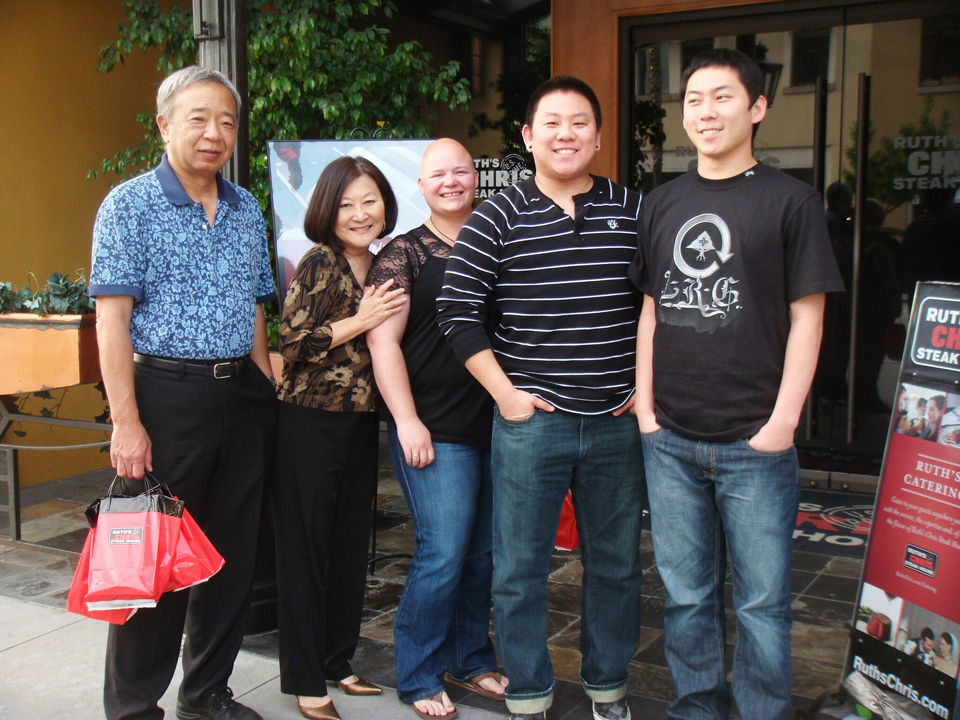By Tim Gruver
Northwest Asian Weekly

The Azumi family. From left: Tad, Marsha, Mary (Aiden’s wife), Aiden and Stefen. (Photo provided by NQAPIA)
For LGBTQ children in Asian and Pacific Islander (API) communities, coming out can be hard to do. Many fear their sexual orientation will shame or dishonor their parents, but staying in the closet can deeply affect their mental health, leading to depression, self-loathing, and even suicide.
Hosted by the National Queer Asian Pacific Islander Alliance (NQAPIA), the Asian Family Acceptance Workshop Tour will be stopping in Seattle July 10 to provide parents of LGBTQ children the support and resources they need to talk with their children about coming out. The event will be held at El Centro de la Raza from 3:00-5:00 p.m.
The workshop’s speakers will include author, educator, and LGBTQ advocate Marsha Aizumi, along with Manjula and Balan, who are parents of a transgender daughter.
Now residents of Redmond, Manjula and Balan (last names withheld for privacy reasons) moved to the Pacific Northwest from India five and eight years ago, respectively. They sensed that their daughter was different from other children before she came out in her teens. While they were not surprised by their daughter’s revelation, it took time for them to understand what it meant for them as a family.
While working as a librarian at the Redmond Regional Library, Manjula conducted her own research to learn more about her daughter’s identity through books and whatever information she could find on the internet.
“It’s not as if they’re are no LGBTQ or transgender kids in India, but nobody comes forward because they’re so scared that they won’t be accepted,” Manjula said.
“We still need to do a lot more in terms of education and making people understand that these people are just like us and they’re not really that different.”
Manjula’s research brought her to join the Bellevue chapter of Parents, Families, and Friends of Lesbians and Gays (PFLAG), a nonprofit organization which seeks to support, advocate, and educate people on LGBTQ issues.
She believes that encouraging conversation between LGBTQ people and their families is the best way forward for them understanding one another.
“It is important that all our children get the right of dignity to live their lives as authentically as possible,” Manjula said. “And if I can touch at least one more family or even several families, that would be great, but to accept their kids, that would be my aim for the workshop.”
For Aizumi, the workshop is an opportunity for parents, as well as their children, to come to terms with one another’s struggles.
“It’s not just the parents accepting their children, but it’s the children also accepting the journey that the parents are going through,” said Aizumi, president of the Asian American Pacific Islander chapter of PFLAG in Los Angeles.
Born in Cleveland, Ohio, Aizumi’s work has taken her across the United States and China. She is also the co-founder and current president of the PFLAG chapter in San Gabriel Valley, the first and only API PFLAG chapter.
Aizumi’s son, Aiden, came out as a lesbian during his sophomore year in high school, eventually transitioning from female to male at the age of 20. Unbeknownst to his family, Aiden had already suffered years of physical and emotional abuse by his peers.
Despite being well received by his younger brother, Stefen, Aiden’s coming out was something Aizumi could not accept at first. Her husband, meanwhile, mourned the daughter he believed he had lost in Aiden.
“When my son first came out as lesbian over 10 years ago, I really didn’t know very many people that had LGBTQ children,” Aizumi said. “As a mother, I thought I had failed and that had I been a better mother, my child would not be a lesbian.”
As they learned more about the LGBTQ community, Aizumi and her husband’s fear and confusion grew into a loving acceptance for who Aiden was. Since then, the two have written about their journey together as mother and child in Aizumi’s book, “Two Spirits, One Heart,” which Aiden contributed to as an adviser.
“As I got educated, I realized that it wasn’t a choice that my son was born this way and it was more or less a choice for me whether I was going to accept him or not,” Aizumi said. “I think at that point, I had decided that transparency and voice were important.”
As the president of her father’s company, Ogino-Aizumi Insurance Agency, Aizumi knew what it was like feeling different in a male dominated workplace. Aizumi, however, did not initially see herself as an activist.
“My idea of being an activist wasn’t something I could relate to,” Aizumi said. “I thought you had to be angry, you had to be loud, you had to have blow horns, you had to show up to protests. Now I realize that my greatest power comes from showing up as myself.”
Aizumi believed that even the most vulnerable people can find strength in themselves.
“Vulnerability can often equate with strength,” Aizumi said. “I think the strongest people are the most vulnerable, and I see that vulnerability and strength in my son.”
Tim can be reached at info@nwasianweekly.com.



